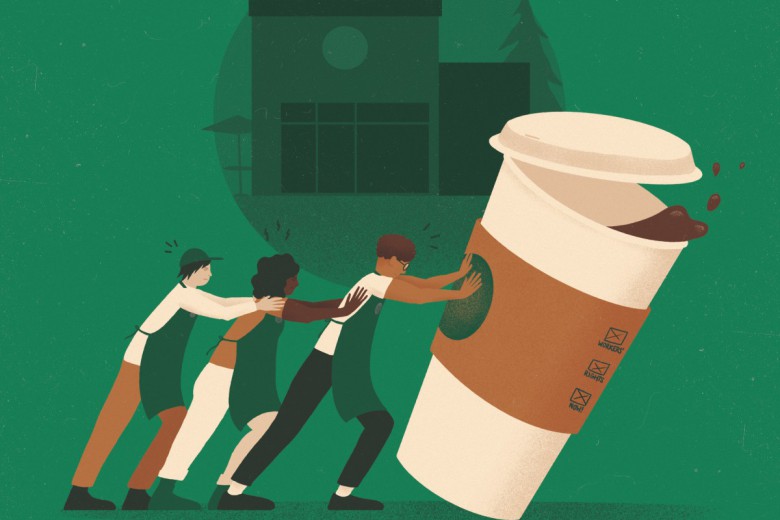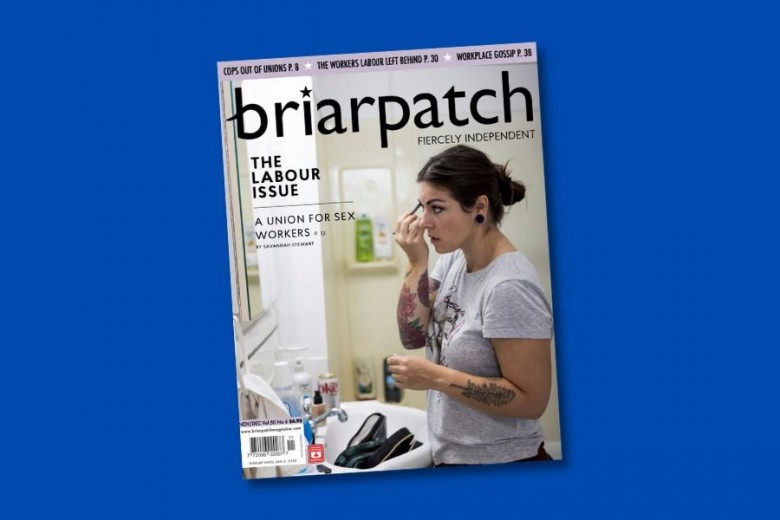On a brisk night in late 2020, my phone lit up unexpectedly with a short Instagram message from one of my co-workers at HuffPost Canada, where I’d worked for a year and a half as an associate editor.
“I wanted to let you know that we are exploring unionizing.”
That message, and others like it to my roughly two dozen other co-workers, kicked off a historic union drive at HuffPost Canada. Over the subsequent months, we would form an organizing committee, reach out to every one of our colleagues, and set goals for improving our workplace now and in the future – entirely remotely due to the COVID-19 pandemic. We’d spend hours in meetings with union representatives and each other, figuring out exactly why we wanted a union and how to make it happen.
On February 23, 2021, the workers of HuffPost Canada and HuffPost Québec filed for certification as part of CWA (Communications Workers of America) Canada, with dreams of reforming how contract workers were treated, pushing for pay equity, and shoring up our rights in the wake of BuzzFeed buying our company.
Exactly two weeks later, we were all out of our jobs.
On March 9, BuzzFeed suddenly shut down the entirety of HuffPost’s Canadian operation in a company-wide meeting straight out of a dark satire, where the password to enter the Zoom session was “spr!ngisH3r3.”
On the surface, it might seem like the months of organizing, card signing, and hope behind the HuffPost Canada union was as dead as the company we worked for. Organizing workers means nothing if you aren’t workers anymore, right?
Reports called the closure, and how BuzzFeed CEO Jonah Peretti executed it, “devastating” and “cruel.” Ensuing articles mourned the loss of one of Canada’s most diverse digital newsrooms when it came to BIPOC, queer, and women’s voices. In the weeks just before and after the closure, HuffPost Canada continued to win awards for our coverage of transphobia, climate change, labour, and race.
Our newsroom’s life was cut short by a profit-driven acquisition scheme on the part of BuzzFeed that also saw closures of international editions in Brazil and India, and massive layoffs in the United States.
On the surface, it might seem like the months of organizing, card signing, and hope behind the HuffPost Canada union was as dead as the company we worked for. Organizing workers means nothing if you aren’t workers anymore, right?
But in reality, because the workers of HuffPost Canada and HuffPost Québec organized when we did, we had access to each other’s solidarity and support throughout the weeks and months following our closure. More importantly, though, we also had the legal and financial backing of more than 25,000 CWA and NewsGuild members across North America, the severance precedents set by our neighbours south of the border in the HuffPost U.S. union, and the union lawyers who had negotiated that severance.
As digital media organizing continues to surge and battles between established media outlets and their unions are more public than ever, our union drive at HuffPost Canada is a prime example of how organizing can make an enormous difference.
In a world where companies like BuzzFeed can close entire outlets with the snap of their fingers and media workers’ rights are constantly under threat, even if you only get a union for two weeks, it’s still better than not having one at all.
Why a union?
HuffPost Canada was my first full-time journalism job. I was hired straight out of grad school in April 2019 as a “viral/trending editor” to work for eight months in place of a worker on medical leave. Even though I worked full-time hours, I was designated a “contractor” – a phrase familiar in many work environments where you’re essentially a full-time freelancer and expected to do the same work as other staffers but with none of the job protection or extended medical benefits. While contract positions have become more common in Canadian media, other industries use contractors, too – food delivery and ride sharing companies like Uber and foodora have come under fire for misclassifying their workers as “independent contractors” in order to deny them rights and benefits.
Upon my hiring, I was assured that company policy was to not keep people on contract longer than a year. At that point either you’re “converted” to full-time or your contract is not renewed and you move on. Many of the full-timers I worked alongside were previously contractors, and many of them had existed in that purgatory for years before the one-year cap was introduced.
I didn’t go to the dentist during that time or get my eyes checked, or go to the therapy I desperately wanted, because I didn’t have extended benefits.
My initial eight-month contract at HuffPost was renewed leading up to my one-year date, and then a pandemic-induced company-wide hiring freeze meant it was extended past that point, because they apparently couldn’t convert me to full-time under the hiring freeze.
I didn’t go to the dentist during that time or get my eyes checked, or go to the therapy I desperately wanted, because I didn’t have extended benefits. I watched my co-workers’ phone bills get paid by the company, while being told mine wasn’t covered because I was a contractor – even though I made the same number of work-related calls as the rest of them.
I bring all of that up because my status as a contractor was a big reason for my individual desire to get involved in a union, even before BuzzFeed entered the picture. My co-workers all had their own reasons, from inequitable promotions to BIPOC hiring policies to mentorship opportunities.
But above all, the looming threat of what BuzzFeed acquiring HuffPost meant for us as workers was at the top of everyone’s minds when those messages started to circulate about potentially organizing.
How do you organize in a pandemic?
On November 19, 2020, before we even heard about it internally, business media broke the news that digital media giant BuzzFeed was acquiring HuffPost from Verizon Media. The announcement of our new parent company was met with a lot of optimism from both BuzzFeed and HuffPost’s public faces.
“BuzzFeed is making this acquisition because we believe in the future of HuffPost and the potential it has to continue to define the media landscape for years to come,” Peretti said in a statement following the announcement.
And while the immediate closure of two international HuffPost outlets in India and Brazil on the day of the acquisition’s announcement should have served as a warning, in Canada we were also tentatively hopeful. Buzzfeed seemed to understand the work we did more than our previous parent company, Verizon. They were hip, they understood internet culture. Maybe they truly believed in the future of HuffPost as much as they said they did.
The announcement promised the deal would be finalized in the coming months, as both sides worked out combining two huge international media brands.
And then the union talk started.
That initial Instagram message I got, and others like it, bloomed into a WeChat group for pro-union staffers. While HuffPost Canada’s main office was then based in downtown Toronto, we had teams in Montreal and Ottawa as well as a few folks scattered across Canada – me in Vancouver and another editor in Calgary.
With a small team spread out across the country, we were used to remote work even before the pandemic made it everyone’s everyday reality. This geographic disparity also meant we were well equipped to organize digitally.
“It actually was a hell of a lot easier than I expected and went a lot more smoothly than some of our in-person drives,” he explains. “People want to work through social media and email, as opposed to through face to face and phone calls.”
That core WeChat group for the organizing committee – lovingly named “The OC” and accompanied by an image of the cast of The O.C. – evolved into weekly meetings with CWA organizers. We had colour-coded spreadsheets and plans for approaching each worker. We worked to specifically recruit voices from across the workplace in terms of perspectives like Quebec workers or parents. And we held dozens of one-on-one meetings over Zoom with each other and the rest of the workforce.
CWA Canada president Martin O’Hanlon says that the seamlessness of the organizing process ended up being an “educational experience” for him and the union in general, because today’s media workers are attuned to online communication.
“It actually was a hell of a lot easier than I expected and went a lot more smoothly than some of our in-person drives,” he explains. “People want to work through social media and email, as opposed to through face to face and phone calls.”
Toward the end of the drive, we held several large-scale meetings with most workers, save for the few still staunchly opposed to the union. We planned to time our public announcement with the closure of the sale to BuzzFeed. As that date kept getting pushed back through January and February, so did our plans to go public. On February 15, the sale was finalized. A week later, so was our union. On February 23, we sent our proper letter to BuzzFeed management and the @HuffPostCAUnion Twitter account burst onto the scene, memes and all.
In the days and weeks following HuffPost Canada’s closure, BuzzFeed insisted that the move was not tied to our drive or its success. According to statements from BuzzFeed, the decision was made in February of 2021, weeks before our intention to unionize was made public at the end of that month.
“The financial struggles of the Canadian piece of the business led to the decision to close it,” a BuzzFeed spokesperson said hours after the closure was made public. “The decisions were made after we examined the state of the business, following the finalization of our acquisition in February.”
O’Hanlon said that in its history, CWA has never had a workplace close in response to unionization, and he agrees that the timing of HuffPost Canada’s demise was likely not tied to our union.
The possibility that BuzzFeed might close HuffPost as a response to our union was something brought up by hesitant workers throughout our campaign. It’s a tactic often threatened by employers as a way to discourage unionization. In reality, employers rarely follow through with the threat. O’Hanlon said that in its history, CWA has never had a workplace close in response to unionization, and he agrees that the timing of HuffPost Canada’s demise was likely not tied to our union.
“My gut tells me ‘no.’ My gut tells me that they had made the decision that they weren’t going to keep the HuffPost Canada operation alive because it probably wasn’t making the money they wanted,” he says.
Still, that means that during the exact same time that the workers of HuffPost Canada and Québec were engrossed in organizing to set up our future under new management, the company we worked for was being marched to the chopping block.
Neither effort was aware of the other – BuzzFeed’s intentions to close HuffPost Canada were kept heavily under wraps even as workers were onboarding to the electronic systems of our new overlords and being welcomed by BuzzFeed staffers with Fiona the Hippo Cameo videos.
These machinations moved on parallel tracks, dating back to BuzzFeed’s announcement of its acquisition of HuffPost in November 2020. These tracks were destined to collide in early March one way or another.
The union got there first.
The power in a union
Now comes the most important part of it all: was it worth it? Those hours of Zoom meetings and agonizing over swaying the most hesitant of workers?
Yes, it was worth it – and there are tangible benefits we can point to. While the infant HuffPost Canada union never ratified a collective agreement or partook in any bargaining, our peers across the company had. Because of the work of the HuffPost union in the United States, and the BuzzFeed union in Canada and the U.S., we had access to more generous severance packages than we would have otherwise.
Further, because we filed for certification and became CWA members when we did – even if just for those two weeks – we had access to the union’s legal counsel throughout severance negotiations and the reverberations of the closure. For workers like me, who couldn’t dream of affording to hire our own labour lawyers, it was invaluable in ensuring we got the best treatment possible. And the day we signed those CWA cards (albeit virtually), we became CWA members with access to their services.
“When BuzzFeed did this horrible thing and decided to shut it down, we said we’ve still got to help – people aren’t members anymore, but we still gotta help them out,” O’Hanlon remembers. “I said ‘Let’s get our lawyers in here and provide access and pressure the company a bit,’ and that’s what we did.”
More importantly, though, we also had the legal and financial backing of more than 25,000 CWA and NewsGuild members across North America, the severance precedents set by our neighbours south of the border in the HuffPost U.S. union, and the union lawyers who had negotiated that severance.
Because of the prior work of the HuffPost U.S. union and the work of CWA Canada, my laid-off co-workers got at least eight weeks of paid severance, and their medical benefits were extended to cover months after the closure.
Digital media organizing continues to make headlines across North America. Few large non-union newsrooms exist anymore, and even small newsrooms of just a few people, like that of the Narwhal, are seeing the value of having a union.
At the New York Times, the union is fighting to ensure trans writers can have their deadnames removed from articles. At the New Yorker, workers recently won better pay for contractors and copy editors. At HuffPost and BuzzFeed’s existing newsrooms, both unions are working to ensure work rights are shored up for when the next crisis hits. They’re pushing back internally over what happened to us, to ensure it doesn’t happen again.
The workers of HuffPost Canada got to have a union for two weeks, but its impact will last a lifetime.







